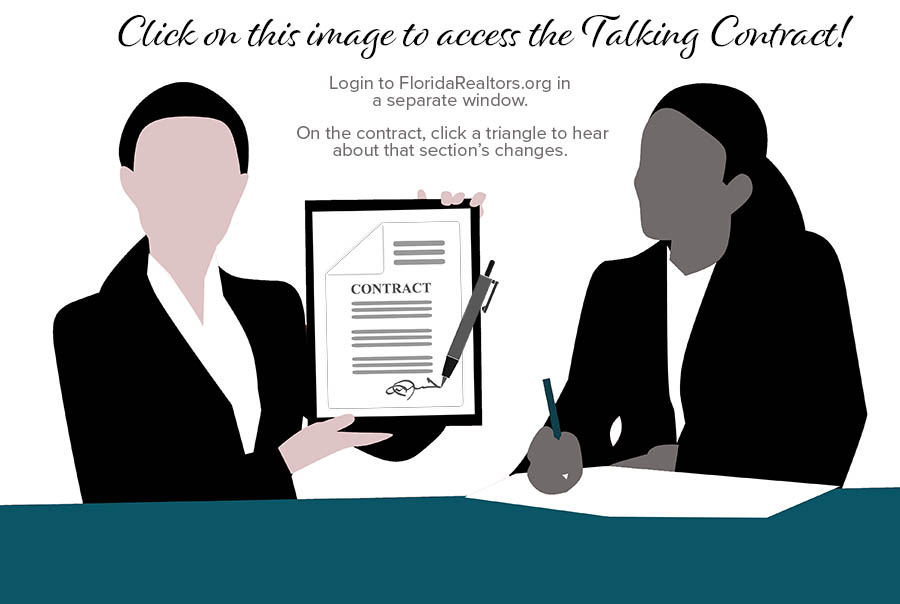Contracts I & II
2021 FR FL Bar Financing Paragraph Explained 10 19 20. This webinar with Florida Realtors® attorneys, which was recorded October 19, 2021, goes through the changes to the Financing Paragraph in the updated Florida Realtors/Florida Bar AS IS Contract and Residential contracts, which go into effect November 1, 2021.
A kick-Out Clause Beats a Home Sale Contingency For Sellers
Kick-Out Clause vs. Home Sale Contingency
Depending on the type of real estate market you are likely to see different clauses added to a real estate contract.
When the real estate market favors sellers home sale contingencies almost become extinct. In hot markets there would never be a need for a seller to even considered a home sale clause.
The way the real estate market has performed over the last few years, sellers have been presented with multiple offers on a significant percentage of properties.
Bidding wars have been the norm not the exception. Most real estate agents would laugh at the thought of seeing an offer with a home sale contingency.
When the real estate environment shifts from a seller’s market to a buyer’s market that will change.
More buyers will ask their buyer’s agent to submit a home sale contingency into their offer. There will still be a significant percentage of sellers that will say thanks, but no thanks.
With a home sale contingency, an owner loses all control over the home sale process. They are relying on someone else to do what is necessary to get their home under contract.
However, there is one alternative that will become more popular. It’s called a kick-out clause. You may be wondering what a kick-out clause is? Maximum Real Estate Exposure does an excellent job explaining a kick-out clauses in real estate.
We will also do the same. You’ll likely conclude that a kick-out clause beats a home sale contingency hands down.
What is a Kick-Out Clause?
A kick-out clause is language inserted into an offer to purchase real estate that says a seller can terminate the current agreement and move on to a different buyer if the current buyer does not remove specific contingencies.
The contingency that most often needs to be removed is the home sale clause.
Kick-out clauses can be helpful to both parties but tend to be more beneficial to a home seller.
Having a kick-out clause instead of a home sale contingency allows the seller to have some control over their sale. They are not locked into a contract with a buyer who may fail at selling their existing home.
Most sellers don’t want to wait an endless amount of time for a buyer to get their home under agreement.
The kick-out clause allows the seller to “kick out” the first buyer should another buyer come forward. It can also be called an active kick-out clause in some circles.
So, in summary, a kick-out clause is a provision in a contract that allows the seller to withdraw from the agreement without penalty or reprisal.
What Happens with a Kick-Out Clause?
The way a kick-out clause will come into play is when a new buyer comes forward and makes an offer on the property.
The property stays active in the Multiple Listing Service with a designation of there being a kick-out clause in place.
When a seller receives a new offer, they would be willing to accept, notification must be given to the first buyer. A seller might like the 2nd offer better for any number of reasons including a higher price or fewer real estate contingencies.
The original buyer them must decide if they are willing to continue without a home sale contingency. The common time frame a buyer is given to make their decision usually ranges from 24-72 hours.
If a buyer does not wish to remove their home sale contingency, they will be able to terminate the contract. The buyer will be given their earnest money deposit that is held in escrow.
When the buyer moves forward without the home sale contingency, their earnest money will be at risk if they cannot complete the sale.
Most contracts will be written such that a buyer will not be able to use their mortgage contingency as a means to escape the sale.
The language will say that selling their home cannot be a reason for having a mortgage rejection. The kick-out situation is the perfect example of when a buyer could purchase a contingent house.
How Does a Kick-Out Clause Help Buyers?
When you are buying and selling a home at the same time, there is a lot of uncertainty involved. Many home buyers would love to know how their finances are going to work out at the completion of the buy and sell.
A kick-out clause lets a buyer pre-negotiate the terms a seller would be willing to accept. Having this information could be helpful to the buyer when it comes to negotiating the sale of their own place.
If they get a decent deal from the seller, they may be willing to be a bit more negotiable on their own sale.
The Seller Wins in a Kick-Out Clause
Even though a kick-out clause can be somewhat helpful to a buyer, the clear winner is the seller. It really is a best of both worlds clause from a seller’s standpoint.
You have a buyer that clearly loves your home, but you also have the opportunity to possibly get even better terms. It is a win-win situation.
The only real downside of a kick-out clause for a seller is the time period to wait for an answer from the buyer.
If buyer #2 is under the gun to find a home, the kick-out clause could be a turn-off. They could decide to pursue a different home instead.
Final Thoughts on Kick-Out Clauses
The purpose of a kick-out clause is to protect the interests of both the seller and the buyer. By having a kick-out clause, the seller can protect themselves from the possibility of not selling the property at the expected time.
From the buyer’s standpoint they get to find out upfront what terms a seller will find acceptable.
Sometimes a kick-out clause ends up working for both parties and sometimes it doesn’t. It is always worth considering as a fallback plan in markets that are neutral or tend to favor buyers.
CONTRACT CHANGES FOR 11.01.2021 BY MARGY GRANT, FLORIDA REALTORS LEGAL COUNSEL
LOGIN TO YOUR FLA. REALTOR (https://www.floridarealtors.org) ACCOUNT ON A SEPARATE TAB BEFORE CLICKING ON THE LINKS BELOW:
AS IS Residential Contract for Sale and Purchase
Residential Contract for Sale and Purchase
New riders
- CR-6 Rider I Mold Inspection (used with standard Residential Contract for Sale and Purchase, not AS IS)
- CR-6 Rider DD Seasonal/Vacation Rental
- CR-6 Rider EE PACE
Updated riders
SUMMARY OF RIDER CHANGES
CR-6 B. Homeowners Association HOA – Community Disclosure
CR-6 E. FHA – VA
CR-6 L. Right to Inspect and Right to Cancel
CR-6 T. Pre-Closing Occupancy By Buyer
CR-6 U. Post-Closing Occupancy By Seller
CR-6 V. Sale Of Buyers Property
CR-6 W. Back-Up Contract
CONTRACTS I : TO BE RE-RECORDED WITH CHANGES
CONTRACTS II : TO BE RE-RECORDED WITH CHANGES


